A facial tumor not only eroded Rogelio Mayuga’s health but also devoured his confidence. Throughout his seven-year battle against cancer, he faced repeated relapses and disappointments, eventually withdrawing from social interactions and isolating himself. That was until he arrived at Guangzhou Modern Cancer Hospital. There, minimally invasive integrative therapy not only shrank his tumor but also mended his broken spirit. This is a story of technology, courage, and dignity.
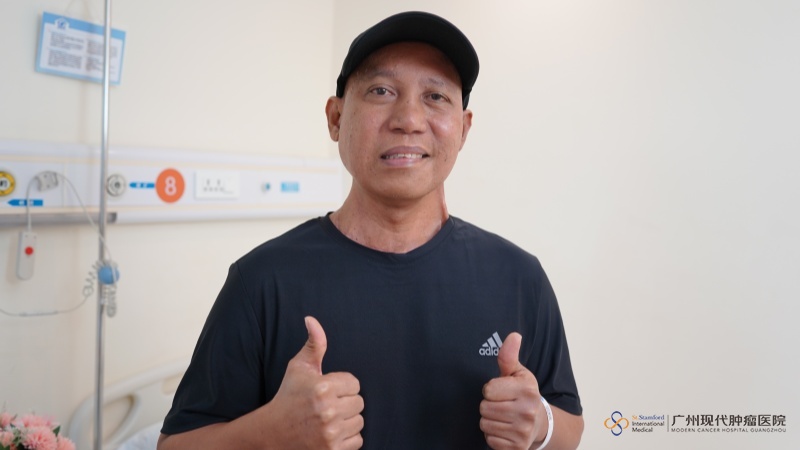
Rogelio Mayuga
Seven Years of Agony from a Facial Tumor: From Outgoing to Withdrawn
In 2018, Rogelio’s life was completely upended by an inconspicuous mass on the right parietal-occipital area of his head. Surgery confirmed it as a malignant parotid neuroendocrine tumor. Local doctors recommended postoperative radiotherapy and chemotherapy, but he refused: "I’ve seen the side effects of traditional radiotherapy and chemotherapy—hair loss, weakness, skin ulcers... I couldn’t imagine experiencing that myself."
Yet the disease did not let him go. Over seven years, the tumor recurred multiple times—in both sides of his neck and the left parotid gland. Each surgery was followed by another relapse. The tumor spread like ivy, gradually consuming his face.

Before his illness, Rogelio lived a normal, happy life
In January 2025, he underwent another surgery in the Philippines. Unfortunately, the tumor in his parotid gland was not completely removed and began to grow again. The mass continued to enlarge, becoming increasingly large and painful, devouring his face and impairing his ability to hear, speak, and swallow. Even worse, it eroded his confidence and hope. He withdrew from social interactions and avoided looking in the mirror. The once outgoing, confident, and cheerful Rogelio was gradually fading away.
“During that time, I shut myself away. I was afraid to interact with others, and every night, the pain and anxiety made it hard to sleep,” recalled Rogelio. “The tumor took away not only my health but also my dignity.”
Minimally Invasive Integrated Approach: A "Microscopic War" with 80 Particles
At the brink of despair, Rogelio learned about Guangzhou Modern Cancer Hospital through social media. What particularly attracted him was the philosophy of "Precision Integrated Therapy" – a approach designed to effectively control the tumor while maximizing the protection of normal function and minimizing side effects.
In June 2025, he traveled thousands of miles to China.
The hospital's multidisciplinary team (MDT) designed a tailored "Precision Strike" minimally invasive integrated plan for Rogelio, centered around radioactive seed implantation: a combination of 125I radioactive seed implantation + interventional chemoembolization + immunotherapy.
Interpretation of Treatment Plan
125I Radioactive Seed Implantation: Like "implantable missiles," 80 low-activity radioactive seeds are precisely placed inside the left parotid gland tumor. They continuously release radiation to destroy cancer cells while causing minimal damage to surrounding healthy tissues.
Interventional Chemoembolization: High-concentration chemotherapy drugs are delivered directly to the tumor site via an arterial catheter, "poisoning and bombing" the tumor while avoiding systemic side effects.
Immunotherapy: PD-L1 inhibitors are used to activate the body’s immune system, creating a long-term tumor control effect. This also enhances the body’s resistance to viral and bacterial infections.
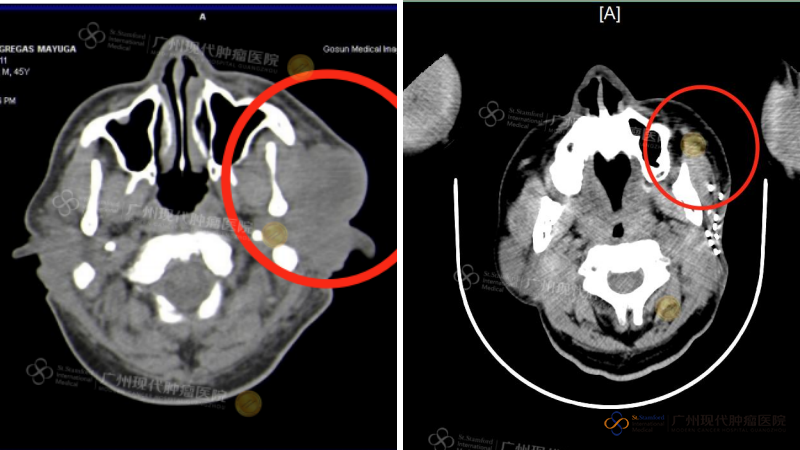
CT comparison before and after treatment
Director Lin Jing, who attended to Rogelio, stated, "Rogelio's case is highly unique. With multiple recurrences, a tumor located in a critical functional area, and a strong desire to 'preserve facial appearance,' he also exhibited significant fear towards radiotherapy and chemotherapy. Moreover, the tumor was situated in the parotid and neck region, an area with complex anatomical structures. Every detail of the treatment plan required meticulous calculation, including the placement of radioactive particles, the selection of activity levels, and the timing of immunotherapy drugs. Our goal is not only to treat the cancer but also to preserve function, appearance, and quality of life!"
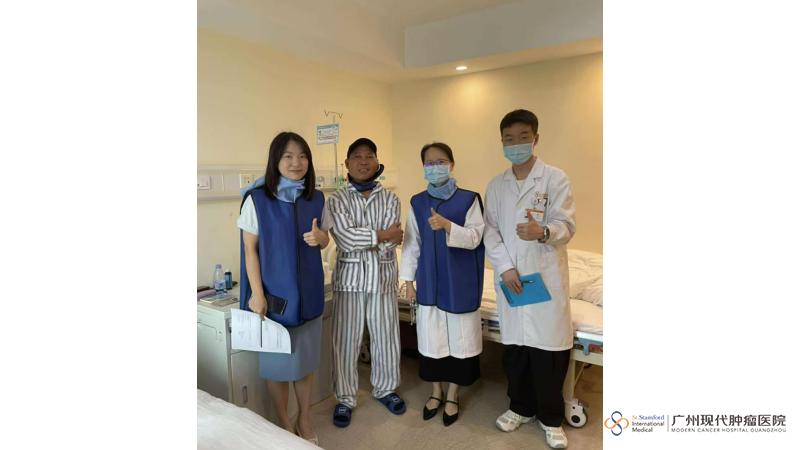
Group photo of Rogelio with Director Lin Jing, Dr. Dong Kui, and translator Lily
On June 11, 2025, Rogelio underwent radioactive seed implantation therapy, during which 80 radioactive particles were implanted into his parotid gland area. Post-surgery, the wounds were almost invisible. Miraculous changes followed the treatment: within three days, the tumor began to soften and shrink; within a week, the pain significantly decreased, allowing him to finally sleep well; and within a month, the facial swelling had largely subsided, with notable improvements in hearing and swallowing function.
The treatment process was far easier than Rogelio had imagined: the seed implantation left only a few tiny needle marks on his face, and the interventional therapy was performed through an artery.
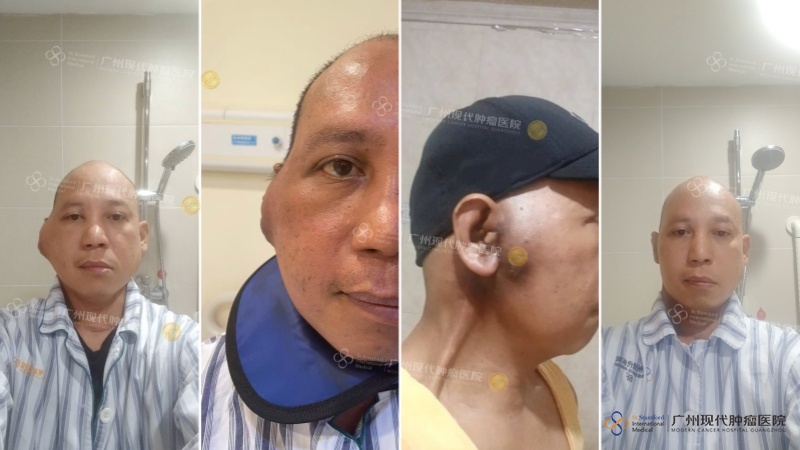
Comparison of the patient's facial changes before and after treatment
"No hair loss, no skin ulcers, no prolonged weakness... The minimally invasive treatment protected my face and preserved my dignity as a person," Rogelio said emotionally. "I no longer hide from others; I can look people in the eye. My doctors truly made it happen!" Today, he has successfully completed three cycles of integrated treatment, with the tumor significantly reduced, clear speech, and regained social confidence.
Director Lin Jing remarked, "The treatment results are even better than we expected. The tumor has significantly shrunk, and the patient's facial nerve function has been largely preserved. This exemplifies the advantage of minimally invasive integrated treatment—ensuring patient quality of life while pursuing efficacy.
Technology and Humanistic Care: Helping Him Rediscover the Courage to Live
At Guangzhou Modern Cancer Hospital, Rogelio experienced not only cutting-edge technology but also warm and compassionate care: medical staff patiently explained each step of the treatment to alleviate his anxiety; a nutrition team customized meals to help him regain strength; and psychological support was integrated into daily care, helping him gradually overcome his insecurities. Rogelio gratefully said, "This hospital not only treated my disease but, more importantly, it restored my courage to live! It gave me the ability to continue living joyfully!"
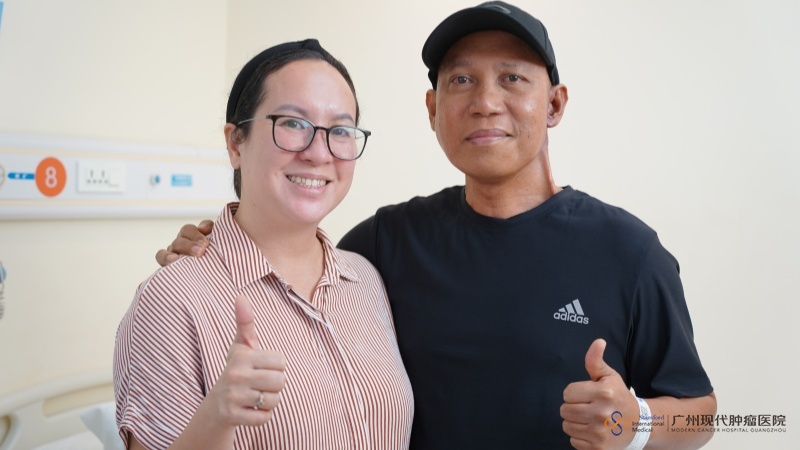
Photo of the patient with his wife
"Technology addresses the disease, while humanistic care heals the soul," Director Lin Jing noted. "Especially for patients with facial tumors, their psychological trauma often runs deeper than their physical pain. We must not only be good doctors but also dedicated guardians."
Rogelio's experience reflects the evolution of cancer treatment philosophy. The goal of modern healthcare is no longer simply to remove lesions but to eradicate the disease while maximizing the preservation of patient function, appearance, and life quality. Precision-based, personalized, and humanistic integrated minimally invasive cancer treatments are igniting hope for more patients—to live, and to live well.
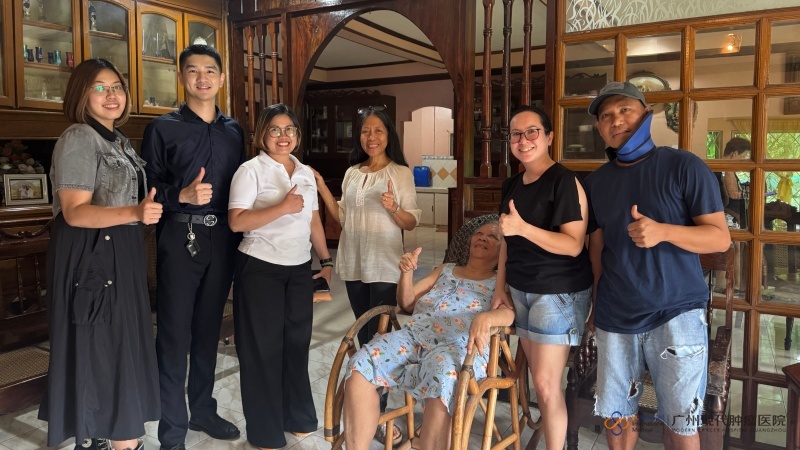
Philippines International Service Center staff visiting the patient
*Surgery, in addition to the appropriate chemotherapy and radiotherapy, are effective in treating early cancer, but certain patients in late stage of cancer may not be tolerate surgery well as they can be relatively weak. A combination of carefully planned minimally invasive therapy, chemotherapy or radiotherapy can effectively reduce the side effects and discomfort of treatment and may help patient get better efficacy.













 viber
viber